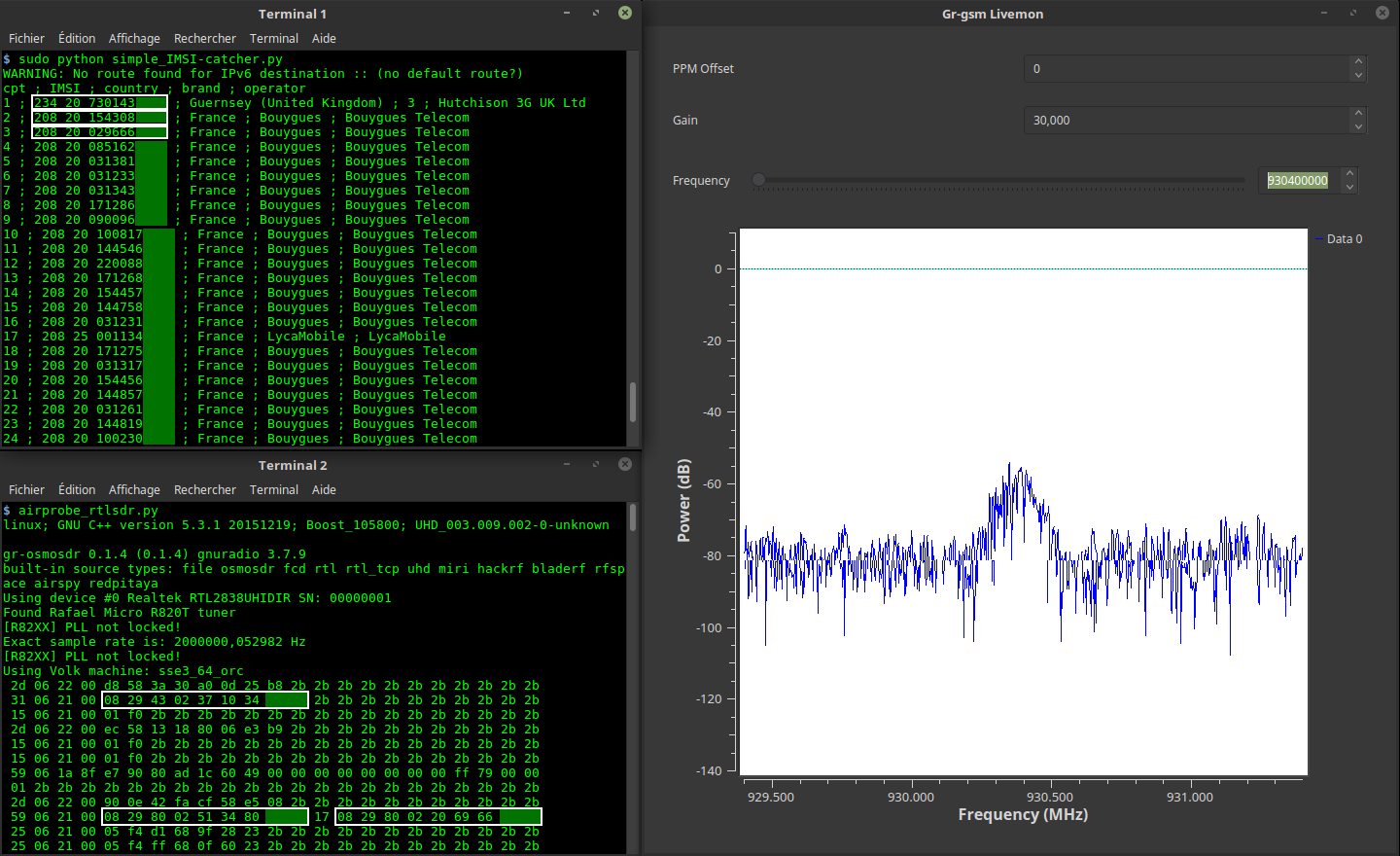This program shows you IMSI numbers, country, brand and operator of cellphones around you.
/!\ This program was made to understand how GSM network work. Not for bad hacking !
1 PC with Gnu/Linux. Tested with :
- debian 10
- Ubuntu 20.04/LinuxMint 20+
- Kali 2020+
1 SDR receiver. Tested with :
- USB DVB-T key (RTL2832U) with antenna (less than 15$)
- OsmocomBB phone
- HackRF
- BladeRF
git clone https://github.com/Oros42/IMSI-catcher.git
cd IMSI-catcheror
wget https://github.com/Oros42/IMSI-catcher/archive/master.zip && unzip -q master.zip
cd IMSI-catcher-mastersudo apt install python3-numpy python3-scipy python3-scapyWarning : don't use python 3.9 (ctypes bug)!
You have the choice with 2 types of gr-gsm's install : in your OS or with docker.
sudo apt-get install -y \
cmake \
autoconf \
libtool \
pkg-config \
build-essential \
python-docutils \
libcppunit-dev \
swig \
doxygen \
liblog4cpp5-dev \
gnuradio-dev \
gr-osmosdr \
libosmocore-dev \
liborc-0.4-dev \
swiggnuradio-config-info -vif >= 3.8
git clone -b maint-3.8 https://github.com/velichkov/gr-gsm.gitelse (3.7)
git clone https://git.osmocom.org/gr-gsmcd gr-gsm
mkdir build
cd build
cmake ..
make -j 4
sudo make install
sudo ldconfig
echo 'export PYTHONPATH=/usr/local/lib/python3/dist-packages/:$PYTHONPATH' >> ~/.bashrcdocker pull atomicpowerman/imsi-catcher
docker run -ti --net=host -e DISPLAY=$DISPLAY --privileged -v /dev/bus/usb:/dev/bus/usb atomicpowerman/imsi-catcher bashTODO : fix DISPLAY error
Run all grgsm_* in this docker.
We use grgsm_livemon to decode GSM signals and simple_IMSI-catcher.py to find IMSIs.
python3 simple_IMSI-catcher.py -hUsage: simple_IMSI-catcher.py: [options]
Options:
-h, --help show this help message and exit
-a, --alltmsi Show TMSI who haven't got IMSI (default : false)
-i IFACE, --iface=IFACE
Interface (default : lo)
-m IMSI, --imsi=IMSI IMSI to track (default : None, Example:
123456789101112 or "123 45 6789101112")
-p PORT, --port=PORT Port (default : 4729)
-s, --sniff sniff on interface instead of listening on port
(require root/suid access)
-w SQLITE, --sqlite=SQLITE
Save observed IMSI values to specified SQLite file
-t TXT, --txt=TXT Save observed IMSI values to specified TXT file
-z, --mysql Save observed IMSI values to specified MYSQL DB (copy
.env.dist to .env and edit it)
Open 2 terminals.
In terminal 1
sudo python3 simple_IMSI-catcher.py -sIn terminal 2
grgsm_livemonNow, change the frequency until it display, in terminal, something like that :
15 06 21 00 01 f0 2b 2b 2b 2b 2b 2b 2b 2b 2b 2b 2b 2b 2b 2b 2b 2b 2b
25 06 21 00 05 f4 f8 68 03 26 23 2b 2b 2b 2b 2b 2b 2b 2b 2b 2b 2b 2b
49 06 1b 95 cc 02 f8 02 01 9c c8 03 1e 57 a5 01 79 00 00 1c 13 2b 2b
You can watch GSM packets with wireshark.
sudo apt install wireshark
sudo wireshark -k -Y '!icmp && gsmtap' -i logrgsm_scannerARFCN: 974, Freq: 925.0M, CID: 2, LAC: 1337, MCC: 208, MNC: 20, Pwr: -41
ARFCN: 976, Freq: 925.4M, CID: 4242, LAC: 1007, MCC: 208, MNC: 20, Pwr: -45
Now, you can set the frequency for grgsm_livemon :
grgsm_livemon -f 925.4MOr, for hackrf, fetch the kalibrate-hackrf tool like this:
sudo apt-get install automake autoconf libhackrf-dev
git clone https://github.com/scateu/kalibrate-hackrf
cd kalibrate-hackrf/
./bootstrap
./configure
make
sudo make installRun
kal -s GSM900kal: Scanning for GSM-900 base stations.
GSM-900:
chan: 14 (937.8MHz + 10.449kHz) power: 3327428.82
chan: 15 (938.0MHz + 4.662kHz) power: 3190712.41
...
Use db-example.sql to create your DB.
cp .env.dist .env
nano .env
# set your config
sudo apt instal python-decouple python3-mysqldbsudo python3 simple_IMSI-catcher.py -s --mysqlScan frequencies and listen the 1st found :
In terminal 1
python3 scan-and-livemonIn terminal 2
python3 simple_IMSI-catcher.pySetup of Gr-Gsm : https://osmocom.org/projects/gr-gsm/wiki/Installation and https://github.com/velichkov/gr-gsm
Frequency : http://www.worldtimezone.com/gsm.html and https://fr.wikipedia.org/wiki/Global_System_for_Mobile_Communications
Mobile Network Code : https://en.wikipedia.org/wiki/Mobile_Network_Code
Scapy : http://secdev.org/projects/scapy/doc/usage.html
IMSI : https://fr.wikipedia.org/wiki/IMSI
Realtek RTL2832U : https://osmocom.org/projects/sdr/wiki/rtl-sdr and http://doc.ubuntu-fr.org/rtl2832u and http://doc.ubuntu-fr.org/rtl-sdr
To support my work, a tipee would be nice ;-)
https://liberapay.com/Oros/
